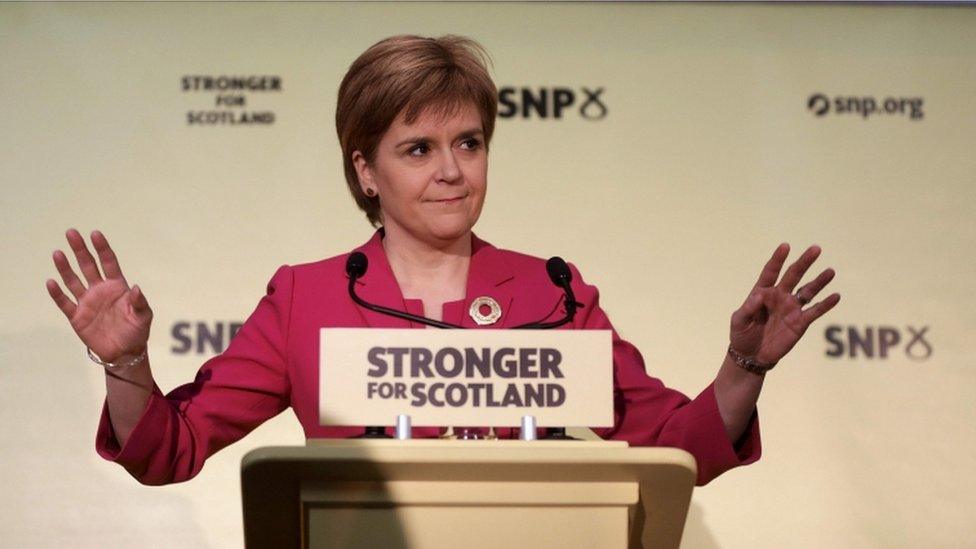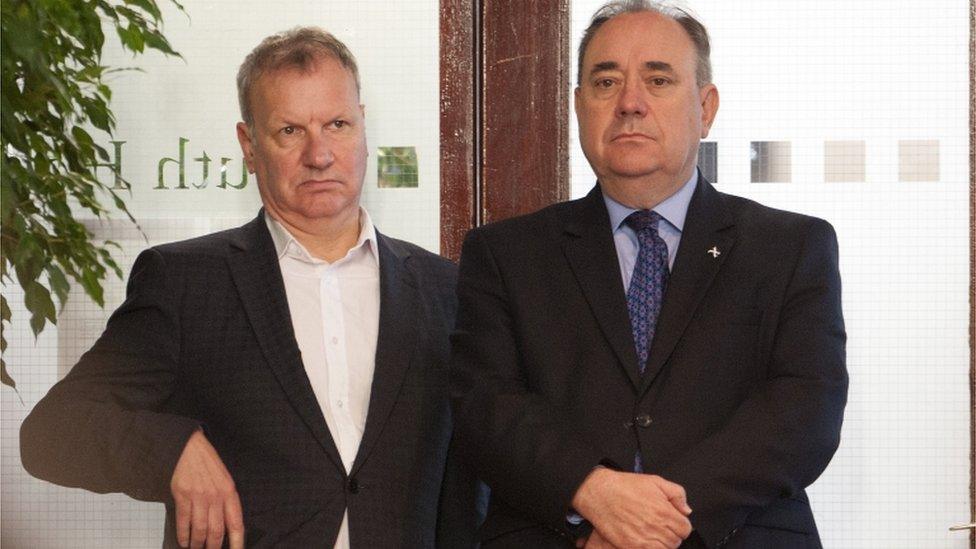Nicola Sturgeon gets advice from all sides
- Published

Nicola Sturgeon delivered a speech in Edinburgh on the anniversary of the independence referendum vote
Nicola Sturgeon is not short of advice on this referendum anniversary day. It comes from a disparate range of people; not all of whom wish to see her party thrive.
Among the rivals, David Cameron reckons she should now shelve any thought of a second referendum. Mr Cameron suggests that the restless nation of Scotland will be placated by the powers in the Scotland Bill, once those are enacted, implemented and absorbed.
In which regard, the prime minister has promised to rewrite a section of the bill to guarantee the permanence of the Scottish Parliament. Under the new wording, it would take a referendum of the Scottish people before Holyrood's writ was removed.
Expect amendments
For the avoidance of doubt, Mr Cameron is not contemplating such a referendum. Nor is he suggesting that Holyrood might usefully quit the scene.
UK government sources insist this measure was suggested by others - including the Scottish government - and they have responded. Similarly, we now expect amendments to be advanced by the Scottish Secretary David Mundell in an effort to clarify new welfare powers and the like.
Will these amendments content the Nationalist critics of the bill? Thought you might say that.
Then advice comes in from Ms Sturgeon's opponents in the Scottish Parliament. Willie Rennie of the Liberal Democrats says 'stick to the day job'.

SNP MPs Pete Wishart and Alex Salmond watch Nicola Sturgeon's speech
He suggests that might include tackling continuing problems with the police and justice system.
Ruth Davidson of the Tories similarly suggests a focus upon devolved powers.
And Kezia Dugdale of Labour advised an emphasis upon the future for youthful Scotland.
For the Greens, Patrick Harvie says 'consult the people. Oh, and dump the notion of a shared currency, post independence'.
Series of triggers
Ms Sturgeon can be expected to respond to these sundry suggestions with the blend of politesse and blunt repartee she has made her own.
But then she is being offered advice from quarters rather closer to her own political home.
I have already noted that her predecessor Alex Salmond has posited a series of triggers which might occasion a further referendum.
Former SNP deputy leader Jim Sillars says the party must prepare fully and thoroughly for a second plebiscite.
He also says the currency policy was a mistake.
Further, he disliked the White Paper, suggesting it melded uneasily into a party manifesto, inviting attack.
Despite that, he believes a referendum could be held by 2017 or 2018, arguing that, by then, Scotland will be even more disquieted by continuing Conservative rule.
Gordon Wilson, who led the party, counsels caution.
He dislikes the talk of triggers - such as the EU or Trident.
Following such logic, he says, might lead the SNP to call a referendum when neither the party nor the country is ready.
The result? The Yes campaign would lose again.
Core message
Mr Wilson says campaign energetically on the concept and proclaimed benefits of independence, going to the country when the electoral moment is right.
Nicola Sturgeon will listen closely and carefully to all of these views. It is, however, possible to discern some of her emergent thinking from her speech today.
Yes, she advised the prime minister that Conservative policies - such as economic austerity, welfare cuts and Trident renewal - would impel Scots towards independence. This was not, of course, truly aimed at the PM but at the people of Scotland.
But she had another core message, aimed directly at her party: the parliamentarians in the hall, the 112,208 members.
This was to the effect that enthusiasm and zeal are not enough.
It was not sufficient to agitate for independence with added enthusiasm.
Without other changes, that would mean that the 45% vote for independence would remain unaltered.
Ms Sturgeon is steering a cautious path.
She wants to keep the 112,208 energetic: campaigning, delivering leaflets, discussing, debating, paying their subs.
Genuine change
Independence must remain feasible.
Equally, she is innately cautious.
As I have stressed repeatedly, she has zero interest in staging a token referendum. She does not want to hold a referendum. She wants to win one.
To repeat, I believe that the issue of EU membership has a different status in the FM's thinking from other supposed triggers.
Brexit without Scottish consent would be seen as a genuine change to the constitutional governance of Scotland.
Other things being equal, Ms Sturgeon might regard that as a starting point for a Scottish referendum.
The others - Trident, austerity, welfare and the rest - fall into a different category.
They are foreshadowed policy questions which might, according to the FM, push Scotland towards favouring independence and thus demanding a referendum but which do not qualify, in their own right, as triggers.
The true trigger, of course, remains popular opinion.
Nicola Sturgeon will seek to hold a referendum if and when she believes she would win.
Which requires her party to win the next Holyrood election in order to be in a position to table the referendum.
Which then requires a sustained period of successful reassurance of the Scottish people over the economy, oil price notwithstanding.
Which requires a prolonged period of consistent support for the Yes proposition.
According to her speech today, she is fairly optimistic about proposition one - although not, she stressed as all leaders do, complacent.
Propositions two and three remain in the pending tray.